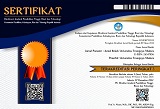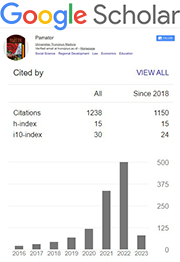Students’ Perceptions on Mobile-Assisted Language Learning (MALL) in EFL Class: An Overview of Altissia Usage
Abstract
Keywords
Full Text:
PDFReferences
Alhadiah, Abdullah, ‘EFL Learners ’ Experience of a MALL-Based Vocabulary Learning Tool’, 10.2 (2020), 283–91
Cukalevska, Marija, ‘Independent Project with Specialization in English The Impact of MALL on English Grammar Learning’, 2020
Darmawati, ‘Improving Speaking Skill Through Mobile-Assisted Language Learning ( MALL )’, 1.1 (2018), 24–30 < http://openjournal.unpam.ac.id/index.php/JTSI>
Ekinci, Ecem & Mithat Ekinci, ‘Perceptions of EFL Learners about Using Mobile
Applications for English Language Learning: A Case Study’, (2017), 13-14
Guo, Hui, ‘Analysing and Evaluating Current Mobile Applications for Learning English Speaking’, British Council ELT Master’s Dissertation Awards: Commendation, 2014, 2–92
Hidayati, Tuti, and Sari Diana, ‘Students’ Motivation to Learn English Using Mobile Applications: The Case of Duolingo and Hello English’, JEELS (Journal of English Education and Linguistics Studies), 6.2 (2019), 189–213
Klimova, Blanka and Petra Polakova, ‘Students’ Perceptions of an EFL Vocabulary
Learning Mobile Application’, 1-8 < doi:10.3390/educsci10020037>
Kukulska-Hulme, Agnes, ‘Will Mobile Learning Change Language Learning?’, ReCALL, 21.2 (2009), 157–65
P.A. Widiana, et al, ‘Tenth Grade Students’ Perception toward Mobile Assisted Language
Learning (MALL) in Learning English in Buleleng Regency in Academic Year 2017/2018’, (2018), 1-13
Pramesti, and Ani Susanti, ‘Students’ Perception of the Use of Mobile Application Duolingo for Learning English’, International Journal of Scientific and Technology Research, 9.1 (2020), 1800–1804
Rinanda, Desika, Suparno, and Sri Samiati Tarjana, ‘ELS Journal on Interdisciplinary Studies on Humanities’, ELS Journal on Interdisciplinary Studies in Humanities, 2.4 (2019), 499–514
Sadikin, Ali, and Afreni Hamidah, ‘Pembelajaran Daring Di Tengah Wabah Covid-19’, Biodik, 6.2 (2020), 109–19
DOI: https://doi.org/10.21107/pamator.v15i1.14103
Refbacks
- There are currently no refbacks.
Copyright (c) 2022 Rizky Vita Losi

This work is licensed under a Creative Commons Attribution-ShareAlike 4.0 International License.
Jurnal Pamator : Jurnal Ilmiah Universitas Trunojoyo by Universitas Trunojoyo Madura is licensed under a Creative Commons Attribution-ShareAlike 4.0 International License.















.png)